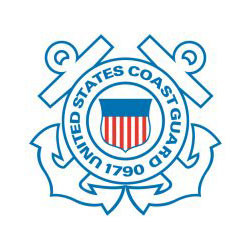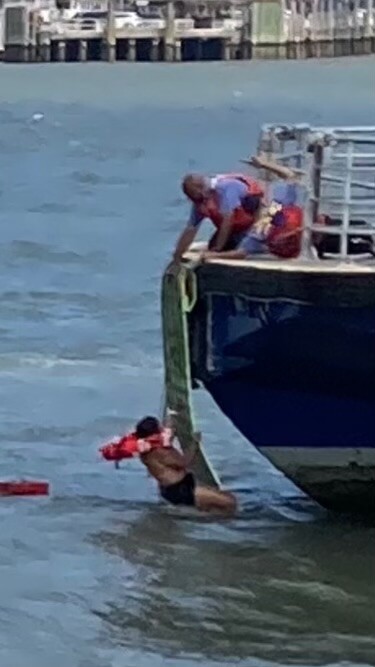Coast Guard is emphasizing personal boating safety after a tragic fatal boating accident in Manhattan on the Hudson River yesterday afternoon.
The Coast Guard, along with the New York Police Department and fire department and local ferry operators, responded to an overturned vessel in the river that left two dead and two critically injured Tuesday afternoon.
Watchstanders at the Coast Guard Sector New York command center received the initial report from Citywide 911 of an overturned 24' Yamaha outboard-motor vessel with 12 people on board near the Intrepid Museum on West 42 Street. A small craft advisory was in effect during the time of the incident.
The Coast Guard is currently investigating the cause and circumstances of the incident.
“We offer our deepest condolences to those affected by this tragic accident,” said Coast Guard Capt. Zeita Merchant, captain of the port of New York. “We can’t stress enough how important it is to know your vessel’s limits and how to safely navigate the waters you are operating in. We are incredibly grateful for the swift response of our partner agencies and the ferry crews who acted as quickly as possible to prevent any further casualties.”
The Coast Guard is stressing that all boaters remember these basic safety tips before every boating trip:
- Always wear a life jacket. There is usually little time to reach for stowed vests when accidents occur. Wearing one at all times reduces the risk of drowning. Federal law requires mariners to have a personal flotation device aboard for each passenger.
- Have sufficient means of communication including a VHF radio. VHF channel 16 is the international hailing and distress frequency and can be used to reach the Coast Guard during emergencies.
- Large commercial and military ships have the right-of-way over smaller and more maneuverable boats on the water. It is illegal, according to Rule 9 of the Inland and International Rules of the Road, for boats less than 65' in length to impede the passage of these ships or to cross in front of these ships that impede their passage.
- Be on the lookout for illegal charters. If the vessel is carrying six or more passengers, it must have a valid Coast Guard Certificate of Inspection. Passengers can ask the captain of the vessel to verify their license and the inspection status of the boat.
- Do not carry more passengers than a boat is designed for. Check the boat’s maximum capacity plate (if equipped). Do not carry more passengers or more weight than the boat is designed for. Overloading can cause the boat to ride lower in the water, reduce the vessel’s stability and increase the chance of capsizing. Also, too much weight on one side of the boat can cause the vessel to list and increase the chances of capsizing.
- Never boat under the influence. It is illegal to operate a boat while under the influence of alcohol or drugs. There are stringent penalties for violating BUI/BWI laws, which can include large fines, suspension or revocation of boat operator privileges and jail terms.
- Never turn your back on the water. There are strong rip currents along the Atlantic coast, and sneaker waves are common.
- Dress for the water temperature, not the air temperature. Even if boaters do not plan to enter the water, they should be prepared for an emergency. Paddleboarders, kayakers and wind surfers who are likely to go in the water should wear a wetsuit to decrease their risk of hypothermia and a life jacket to prevent them from drowning before rescuers can get on scene.
- File a float plan. A float plan is simply letting family and friends know where you are going and your expected time of return. File a float plan with someone who is not getting underway with you and stick to the plan. A float plan assists responders in the search of an overdue boater who may be in distress. Float plans can be filed through the Coast Guard’s safety app using the following link:https://floatplancentral.cgaux.org/





